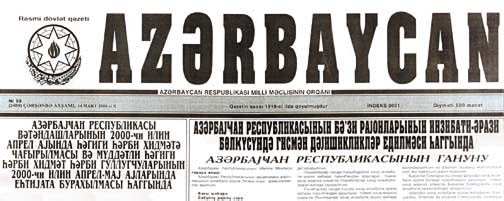|

Spring
2000 (8.1)
Pages
30-31
Afet Babayeva
French
Teacher
  Actually, I wasn't shocked
at all when they announced that we would be changing our alphabet
from Cyrillic to Latin. It seemed rather normal for me. I'm fluent
in French, and since the letters are quite similar, I didn't
expect that I'd have any problems with the Latin. Also, I was
really happy that at last Azerbaijan would have its own distinct
alphabet - not Cyrillic, which had been imposed on us by Russia. Actually, I wasn't shocked
at all when they announced that we would be changing our alphabet
from Cyrillic to Latin. It seemed rather normal for me. I'm fluent
in French, and since the letters are quite similar, I didn't
expect that I'd have any problems with the Latin. Also, I was
really happy that at last Azerbaijan would have its own distinct
alphabet - not Cyrillic, which had been imposed on us by Russia.
The Cyrillic script always seemed a bit difficult. I mean, some
of the letters are complex and difficult to write. I think the
Latin letters are much more aesthetic and beautiful. Our new
script is so close to other major languages, like English and
French.
In terms of getting adjusted to the new alphabet, I haven't had
too many problems. When it first came out, I used to get confused
with some of the letters. But now I'm used to it. I'll have to
admit that when I take notes for myself, I still do it in Azeri
Cyrillic. I guess it's out of habit. I've noticed that many of
my students at the Pedagogical Institute do the same thing. You
can't blame them. They learned Cyrillic at school and it's difficult
to completely transfer to Latin. But I think it's just a matter
of time before everyone gets used to the Latin.
Generation Gap
I'm really sorry that so few books have been published in Latin.
It was a good idea to adopt the Latin script, but I think the
government should have been better prepared for it. They should
have thought about the development of the country. What kind
of development can we have if our youth are uneducated? The government
should publish as many books in Latin as possible so that one
generation won't be separated from the next. Now the young people
can't read what the older people read, and vice versa. Most kids
still have to learn Cyrillic just to be able to gain access to
the books that their parents are reading.

Photo: These days, newspapers
in Azerbaijan often have headlines in Azeri Latin, but text in
Azeri Cyrillic.
Many of the books printed in the new Latin have a lot of mistakes.
Often I've encountered books - mostly school textbooks - where
letters that have similar forms are confused.
Homework for Kids
The Latin script does create difficulties for quite a few families.
For example, I have neighbors who don't know Latin. They send
their kids over to me so that I can help them with their homework.
The parents themselves say they don't have time to learn Latin
because they have so many other things to do. The father works
from early morning until late at night. He's constantly having
to think about how to support his family, especially since we're
living in difficult economic times. The same with the mother.
They have other things to worry about. And so they miss out helping
their kids in school.
Foreigners in Baku
I've noticed that many of the signs on the streets are changing
to Latin. That's a good thing - now foreigners can easily figure
out where they're at. That was quite difficult when we had Cyrillic.
In the past, the foreigners who came to Baku used to learn Russian.
When asked why they didn't learn Azeri, they would say that Russian
was more widely used than Azeri. They didn't want to learn Azeri,
even though the scripts were nearly identical. Still Azeri Cyrillic
seemed more difficult to them. I thought that maybe after we
had our own alphabet, more foreigners would learn Azeri. Unfortunately,
it doesn't seem like that's happening. Most foreigners still
opt for Russian.
When I ask foreigners why they're learning Russian instead of
Azeri, they tell me it's because it's still widely used in Azerbaijan.
It makes me really sad. Why not learn how to say "salam"
(hello) in Azeri instead of "zdravstvuy" in Russian?
It's not that difficult to do.
More Azerbaijanis
Learning Azeri
As far as Azerbaijanis are concerned, it seems more people are
learning Azeri nowadays, even those who used to speak only Russian.
I was astonished to discover this one day at work. Our staff
organized a kind of competition around a poetic form called "bayati"
(short poem of four lines). The person who could recite the most
bayatis would win. We were really surprised when some of the
Russian-speaking girls left the rest of us behind. They knew
more poems in Azeri than we did. That was amazing.
Afet Babayeva (born 1973) is a French teacher at the Azerbaijan
State Pedagogical Institute named after Tusi. Azeri is her mother
tongue and at home, she speaks it with her family, even though
they also know Russian fluently. She also knows French, English,
Russian and some Spanish. She followed the Azeri Track in her
studies at school and at the Institute.
From Azerbaijan
International
(8.1) Spring 2000.
© Azerbaijan International 2000. All rights reserved.
Back to On the Street: Alphabet
Viewpoints Index
Back to Index AI 8.1 (Spring
2000)
AI Home |
Magazine
Choice
| Topics
| Store
| Contact
us
|